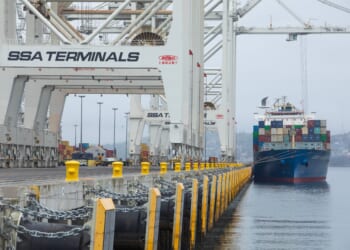Matt Smith has stood as a Conservative and Unionist candidate for Parliament and the Senedd. He was a Policy Analyst at Vote Leave.
In their book Wales Says Yes, the University of Wales authors made the observation that constitution building under devolution ‘has been a process determined almost exclusively within one party’. Unwanted Senedd reforms that expand Welsh Labour and Plaid Cymru’s political class risk eroding the already weak public support for the Cardiff Bay institutions.
Conceived under their Co-operation Agreement of 2021, the Senedd’s new electoral system asks voters to elect a larger Senedd of 96 members (up from 60) in sets of six across 16 ‘super-constituencies’ which according to the Senedd Commission quango makes the institution £19 million more expensive to run. They will choose from closed party lists rather than individual constituency candidates, using the D’Hondt system of proportional representation, whose thresholding was presumed to reward the established parties.
Plans for mandatory gender zipping of list candidates were only dropped after the ECHR warned that gender self-identification would be introduced through the back door. Senedd Leader Jane Hutt asked whether members really ‘want to come back to a Senedd of white men’ – a bizarrely pejorative reference to the second largest group in Wales, notwithstanding the word senate (‘Senedd’ in Welsh) deriving from the Latin ‘senatus’ (assemblage of seniors) of the ‘senex’ (old men), deemed the wisest in Rome.
Discomforted by electoral convergence with England (through Wales’ leave vote, the 2019 Brexit Party victory in the European Parliament elections and Boris Johnson’s Welsh Red Wall), nationalist state builders want to entrench devolution with an entirely separate political system.
Scrapping first past the post (FPTP) for Senedd seats linked to UK Parliamentary constituencies is seen as a further move away from Westminster. A larger Senedd will lead to more conflict with UK governments. While greater party patronage strengthens the devocracy.
With her party facing “the biggest [electoral] kicking in [its] history”, Welsh Labour leader Eluned Morgan has declined to rule out another coalition deal with Plaid or serving under a nationalist First Minister to stop Reform UK. Mark Drakeford has called on “progressive parties to come together”. Plaid has ruled out working with centre-right Unionists but not Welsh Labour. Yet a losers’ lock-in benefiting Labour would confirm perceptions of corrosive Cardiff Bay Cartel politics, first shaped during Brexit Wars when Plaid proposed an anti-Brexit coalition government of left parties.
As with much in the strange quango-driven career of Welsh devolution, Senedd reform was unaccompanied by wider public engagement or civil society mobilisation. The Constitutional Future of Wales Commission found little improvement in public understanding of differences between Cardiff Bay and Westminster after a quarter century – a lacunae of accountability not infrequently exploited by Welsh Labour politicians to campaign against decisions of their own government, nationalising success and unionising failure.
By contrast two thirds of Welsh voters opposed moves away from FPTP in the 2011 Alternative Vote Referendum. In 2016 they voted to leave the EU, abolishing Morgan’s former regional list seat in the European Parliament. No one wants more politicians.
The devolved institutions have struggled to generate the ‘diffuse support’ political regimes need to sustain themselves in the long run through periods of unpopular incumbency.
The failure of Welsh governments to achieve ‘output legitimacy’ (i.e. for the people), through improved public services delivery has been widely commented on. One recent Ipsos poll found nearly three quarters think local public services have deteriorated in the last five years compared to two fifths in England.
Less ink has been spilled on the implications of weak ‘input legitimacy’ (i.e. from the people), expressed through severe levels of public disengagement, weak accountability and indifference to unrepresentative politicians, which could easily deteriorate under the new system.
Firstly, public indifference may well deteriorate under the new system. Only 51 per cent of voters participated in the lacklustre devolution referendum of 1997 (a quarter less than in the preceding General Election). A huge disparity of resources led to strongly differential turnout between ‘Yes for Wales’ and ‘Just Say No’ supporting areas. Home rule squeaked through on a gossamer thin margin of 6,721 votes.
The Neill Committee on Standards in Public Life recorded ‘disturbing’ evidence of a ‘very one-sided’ referendum concluding that ‘a fairer campaign might well have resulted in a different outcome’. Sir John Curtice thought that with slightly higher turnout ‘it is likely that the government’s proposals would have been defeated quite comfortably’.
Despite unprecedented pandemic-era publicity, turnout in 2021 was only one per cent higher (47 per cent) than in 1999 (considered a “huge deficit” at the time). The ruling Welsh Labour party gained less than a fifth of eligible voters for its agenda.
The centre-left IPPR warns we are at a tipping point where ‘elections begin to lose legitimacy because the majority do not take part’. Yet less than half of eligible voters have ever participated in what are characteristically second order elections to Cardiff Bay.
New super-constituencies (some of which are vast) will extinguish any sense of belonging while marginalising local parties hitherto relied on to mobilise voters.
The Democracy and Boundary Commission Wales has adopted monolingual Welsh names for the new seats. When less than a third speak the language, scrapping bilingualism appears less than inclusive.
Together with automatic voter registration for those too disengaged to register, turnout may even fall.
Secondly, closed party lists will produce less accountable politicians. The Senedd’s Reform Bill Committee criticised closed party lists for reducing voter choice by shifting power over candidates from voters to party selectorates susceptible to configuration by apparatchiks.
Closed lists have been panned as ‘an act of extreme control freakery’ by Welsh Labour that has a history of allowing officials to ‘manipulate processes so they get their own way’.
Welsh Government whips already control a Senedd of loyalists reluctant to challenge the executive knowing ex-officio salaried roles in the Cardiff Bay village depend on its patronage.
Instead of representing the people to the Welsh Government, more list members will represent the devocracy to the people.
And thirdly, Senedd bloat confirms perceptions of devolution as a political class project. The Welsh Government’s Innovating Democracy Advisory Group says the public already “do not feel that politicians understand them or hear them”. Prioritising a 60 per cent increase in members will only enhance this.
Most of Welsh Labour’s Senedd caucus were previously politicians elsewhere, party staffers, trades unionists or worked in quangoland, media or the third sector. More Cardiff politicians beckons a mediocrisy of red letter day-seeking careerists, straight out of central casting.
The Independent Remuneration Board’s 6 per cent salary uplift could not have landed at a worse time. Base salaries for members sitting twice a week (when in session) are over twice the median earnings of Welsh workers. Senedd expansion means that the number of politicians in the Senedd who can claim for second homes in Cardiff will almost double.
If turnout remains low or even declines, where does that leave the legitimacy of devolved rule?
The Senedd Commission insists reforms are a “full stop” on constitutional mission creep, hubristically claiming they will ‘future-proof devolution for the next century’.
Yet a recent YouGov harbinger devolution poll found one in three favour scrapping the Senedd and Welsh Government altogether – a morbid symptom of the crisis of devolution.
Premonitions of a Berlin Wall moment that haunt the fever dreams of the devolved establishment.








![Florida Officer Shot Twice in the Face During Service Call; Suspect Killed [WATCH]](https://www.right2024.com/wp-content/uploads/2025/12/Inmate-Escapes-Atlanta-Hospital-After-Suicide-Attempt-Steals-SUV-Handgun-350x250.jpg)








